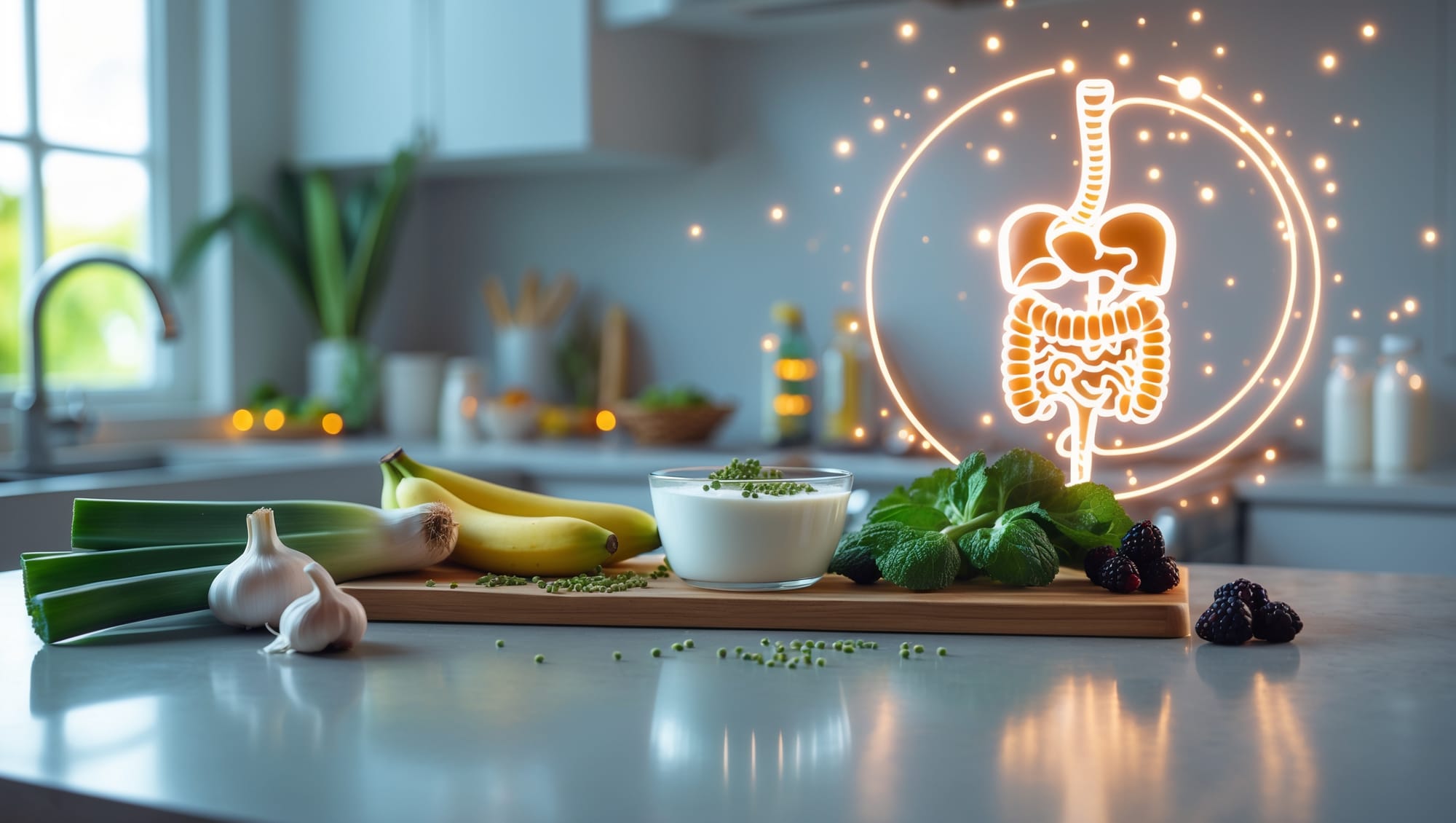How to Reset Your Gut Microbiome for More Energy
Boost your energy naturally by resetting your gut microbiome. Learn how to reduce inflammation, support digestion, and feel revitalized from within.

Learning how to reset your gut microbiome is key to boosting your energy and health. The gut microbiome is vital for digestion, immune function, and energy. By improving your gut health, you can increase your energy and overall well-being.

Key Takeaways
- Resetting your gut microbiome can enhance your energy levels.
- A healthy gut supports digestion and immune system performance.
- Eliminating inflammatory foods can help improve gut health.
- Introducing prebiotic foods is essential for a balanced gut microbiome.
- Follow a structured plan to reset your gut for optimal results.
The Importance of a Healthy Gut Microbiome
A healthy gut microbiome is key to feeling good and having lots of energy. It's filled with trillions of tiny helpers that make sure we get the nutrients we need. They also help our immune system and keep our metabolism working right. Taking care of your gut means you're setting yourself up for a lively and energetic life.
Knowing how gut health affects energy is important. Good bacteria in our gut help break down food, giving us the energy we need. But if our gut is out of balance, we might feel tired and sluggish.
| Factors | Healthy Gut Microbiome | Unhealthy Gut Microbiome |
|---|---|---|
| Nutrient Absorption | Efficient | Inefficient |
| Immune Function | Robust | Weak |
| Energy Levels | High | Low |
To boost energy, we need to focus on what we eat and how we live. Eating foods high in fiber and drinking plenty of water helps keep our gut healthy. This keeps our energy levels up all day long.

Understanding the role of gut health is crucial for feeling more energetic and healthy. By making smart choices for our gut, we can live a more vibrant and energetic life.
How Gut Health Can Impact Your Energy Levels
Understanding the link between gut health and energy is key for well-being. A healthy gut microbiome affects your daily life, including sleep and thinking. The balance of good and bad bacteria in your gut can either boost or drain your energy.
Sleep and Gut Health
Your gut health greatly affects your sleep quality. Poor gut health can cause sleep problems like insomnia or restless sleep. This is because an unhealthy gut often leads to more fatigue and low energy.
Research shows that certain gut bacteria make neurotransmitters like serotonin and dopamine. These neurotransmitters help regulate sleep. Eating a diet rich in prebiotics and probiotics can help keep your gut healthy. This leads to better sleep and more energy.
Focus and Concentration
The gut-brain axis is a system that connects your gut and brain. When your gut health is bad, it can hurt your thinking. This is where the gut health impact on energy is clear, as poor gut health can cause mental fog and lower productivity.
Improving gut health through diet and stress management can boost your thinking. This includes better focus, attention, and memory. Foods like omega-3 fatty acids, leafy greens, and fermented products can help balance your gut and improve mental clarity.

How to Reset Your Gut Microbiome for More Energy
Improving your gut health is key to feeling more energetic and well. By resetting your gut microbiome, you tap into the energy of good bacteria. This leads to more vibrant days.
Eliminating Inflammatory Foods
Getting rid of inflammatory foods is a big step towards better gut health and energy. These foods can upset your gut's balance, causing fatigue and health problems. Avoid these:
- Processed sugars
- Refined carbohydrates
- Trans fats
- Artificial additives and preservatives
Removing these from your diet helps your gut flora grow healthier. This means better energy for you.
Introducing Prebiotic Foods
After cutting out bad foods, add prebiotic foods to your diet. Prebiotics feed your gut's good bacteria. They're non-digestible fibers. Some great prebiotic foods are:
- Garlic
- Onions
- Leeks
- Asparagus
- Bananas
Eating these foods helps reset your gut microbiome. It supports your energy levels and overall health.
Steps to a 3-Day Gut Reset
A 3-day gut reset is a focused way to improve gut health and boost energy. It starts with anti-inflammatory foods, then moves to high fiber foods. Lastly, it includes fermented foods, which are full of probiotics.
Day 1: Focus on Anti-inflammatory Foods
On the first day, focus on eating anti-inflammatory foods. These foods help reduce gut inflammation and make digestion easier. Good choices include fresh fruits, leafy greens, and fatty fish with omega-3 fatty acids.
Day 2: Increase High Fiber Foods
The second day focuses on high fiber foods. These foods help with digestion and regular bowel movements. Start with oatmeal and berries for breakfast, have lentil soup for lunch, and add black beans and chickpeas to dinner.
Day 3: Incorporate Fermented Foods
Day three brings in fermented foods, which are great for gut health and energy. Foods like yogurt, kefir, sauerkraut, and kimchi are full of probiotics. Add yogurt to your breakfast and fermented veggies to your meals.
Incorporating Probiotics and Supplements
Keeping your gut healthy is key for feeling good and having lots of energy. The right probiotics and supplements can really help your gut. This part talks about picking the best probiotic and the great benefits of Prime Biome.
Choosing the Right Probiotic
Choosing a probiotic means knowing what you need for your health. Different ones help with digestion, immunity, and more. For more energy, look for probiotics with Lactobacillus and Bifidobacterium, which are great for your gut.
The Benefits of PrimeBiome
PrimeBiome has a special mix of good bacteria for better health. It helps with digestion, boosts your immune system, and gives you more energy. Adding PrimeBiome to your routine can balance your gut, making it a great choice for supplements.
| Feature | PrimeBiome Benefits |
|---|---|
| Enhanced Digestion | Supports efficient nutrient absorption, reducing digestive discomfort. |
| Immune Function | Boosts the immune system, helping to ward off illnesses. |
| Increased Energy | Provides probiotics for energy, reducing fatigue and boosting vitality. |
Choosing the right probiotics and supplements, like PrimeBiome, can greatly improve your gut health and energy. Always talk to a doctor to find the best fit for you.

Long-term Lifestyle Changes for Gut Health
Keeping your gut healthy for the long haul means making lasting lifestyle changes. These changes include eating a Mediterranean diet and staying active.
Adopt a Mediterranean Diet
The Mediterranean diet for gut health focuses on whole foods like fruits, veggies, whole grains, nuts, and seeds. It also includes healthy fats from olive oil. These foods are full of fiber, antioxidants, and nutrients that help your gut.
Lean proteins like fish and poultry add to this diet. They help keep your gut flora balanced and diverse.
Exercise Regularly
Along with a good diet, regular exercise benefits your gut health a lot. Exercise boosts the variety of gut bacteria. This leads to better digestion, metabolism, and immune function.
It also increases your energy and helps you sleep better. This improves your overall health and energy levels.
By making these lifestyle changes, you set up a strong foundation for gut health and more energy. This makes your journey to wellness both effective and fun.
The Role of Mental Health and Stress Management
Stress and mental health are key to a healthy gut. Managing stress well and getting good sleep can balance your gut microbiome. It also boosts your energy levels.
Techniques for Stress Reduction
Managing stress is important for gut health. Try mindfulness meditation, deep breathing, and regular exercise. These lower cortisol levels, helping your gut stay healthy.
Also, hobbies like gardening or painting help reduce stress. They promote relaxation and are good for your gut.
Sleep Quality and Gut Health
Good sleep is crucial for gut health. Bad sleep can upset your gut bacteria, leading to stomach problems. Stick to a sleep schedule and have a relaxing bedtime routine.
Avoid caffeine and heavy meals before bed. These habits improve sleep and gut health.
Meal Plan Ideas for Gut Health
Creating a good gut health diet plan means eating foods rich in nutrients at every meal. This includes breakfast, lunch, and dinner. These gut-healthy meals help improve your gut health and boost your energy all day long.
Breakfast
Begin your day with a meal that's good for your gut. Try a bowl of Greek yogurt with fresh berries and a bit of honey. Adding chia seeds or flaxseeds gives you more fiber, which is great for your gut. Smoothies with kefir, spinach, and banana are also a smart choice.
Lunch
For lunch, choose a quinoa salad with veggies like bell peppers, cherry tomatoes, and cucumbers. Add chickpeas for protein and some fermented sauerkraut for probiotics. A lentil soup with carrots, celery, and garlic is another good option. Serving it with kimchi can make your gut health diet plan even better.
Dinner
Finish your day with a dinner that's both nourishing and filling. Grilled salmon with steamed broccoli and sweet potatoes is a great choice. It gives you omega-3s and fiber. A tofu stir-fry with bok choy and mushrooms over brown rice is also satisfying. Starting with a cup of miso soup can add probiotics for better gut health.
Free Audiobook: "The Mind-Gut Connection"
Discover a treasure trove of knowledge with the free The Mind-Gut Connection audiobook. It explores the complex link between our gut and health. You'll learn how our mental state and food choices affect our gut.
How This Audiobook Can Help
Grasping the importance of gut health is key to a better life. The Mind-Gut Connection audiobook teaches you to make smart food and mental health choices. It shows how to care for your gut to increase energy, better digestion, and overall health.

Conclusion
Resetting and keeping a healthy gut is key for more energy and better health. Start by changing your diet to avoid foods that cause inflammation. Add foods that help your gut, like prebiotics.
A 3-day gut reset with anti-inflammatory, high-fiber, and fermented foods is a great start. It helps improve your digestion.
Adding probiotics and supplements, like PrimeBiome, helps too. Long-term changes, like eating Mediterranean and exercising, also boost gut health. Managing stress and getting good sleep are important for a balanced gut.
Understanding the link between your gut and energy is the first step to feeling better. With meal plans and resources like "The Mind-Gut Connection," you can keep up these good habits. Remember, taking care of your gut is an ongoing journey to a healthier, more energetic you.
FAQ
How can I reset my gut microbiome to improve my energy levels?
To boost your energy, start by cutting out foods that cause inflammation. Add prebiotic and fermented foods to your diet. Also, eat a balanced diet. This will improve your gut health and energy.
What are the most significant benefits of a healthy gut microbiome?
A healthy gut improves digestion and boosts your immune system. It also enhances mental clarity and energy. Good gut health reduces fatigue and supports your overall well-being.
How does gut health impact my energy levels?
Your gut health affects your energy. An unbalanced gut can cause fatigue and poor concentration. But a healthy gut improves sleep, focus, and energy.
What foods should I avoid to reset my gut microbiome?
Avoid processed sugars, refined carbs, and artificial additives to improve your gut. Instead, eat nutrient-dense, anti-inflammatory foods. This will help your gut health and energy.
How can prebiotic foods improve my gut health?
Prebiotic foods feed good bacteria in your gut. Eating foods like garlic, onions, and bananas supports a balanced microbiome. This boosts your gut health and energy.
What should I eat during a 3-day gut reset?
On Day 1, eat anti-inflammatory foods. On Day 2, increase fiber-rich foods. On Day 3, add fermented foods. This resets your gut microbiome for better health and energy.
How do probiotics and supplements aid gut health?
Probiotics and supplements like PrimeBiome introduce good bacteria to your gut. They help maintain a balanced microbiome. The right probiotic supports gut health and boosts energy.
What lifestyle changes can support long-term gut health?
Eating a Mediterranean diet and exercising regularly are key for long-term gut health. These habits keep your microbiome balanced, improving your gut health and energy.
How can stress management impact my gut health?
Reducing stress and improving sleep are crucial for gut health. Managing stress reduces inflammation and supports a healthy gut. This enhances your energy levels.
What are some meal plan ideas for maintaining gut health?
For breakfast, try yogurt with berries. For lunch, a salad with chickpeas. For dinner, grilled salmon with steamed veggies. These meals boost gut health and energy.
How can the audiobook "The Mind-Gut Connection" help me?
"The Mind-Gut Connection" explores the gut-brain connection. It offers insights on improving gut health for better energy and wellness.
